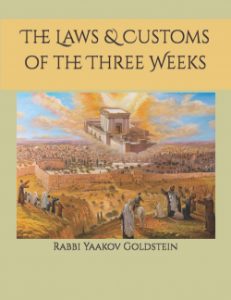13. Diminishing comfort when sleeping:[1]
Sleeping on the floor or with a stone under the head: Some people are accustomed to sleep on the floor on the night of Tisha B’av.[2] Some people are accustomed to place a stone under their head when they sleep.[3] [The Chabad custom is not to sleep on the ground or sleep with a stone under the head (however one is to diminish in comfort, as stated next).[4]]
Diminishing in comfort of sleep:[5] [Even those who do not abide by the above custom] are to diminish their sleeping comfort on Tisha B’av, such as if one normally sleeps with two pillows, he is to sleep with one pillow.[6]
Pregnant women and people who are weak:[7] A pregnant woman for whom it is difficult to have discomfort in her sleep, is not required to abide by any of the above customs. [Likewise, one who is weak is not required to be stringent in this matter and may hence sleep on his bed as usual.[8]]
Q&A May one say good night to another prior to going to sleep?[9] |
[1] 555:2
[2] Michaber ibid; Kol Bo; Chayeh Adam 135:17; Custom of Chasam Sofer
[3] Michaber ibid; Mordechai; Rama ibid “Some people are accustomed to place a stone under their heads in memory of the verse that states “And he took from the stones of the place” being that he saw the Churban. [ibid]
[4] Sefer Haminhagim p. 96 [English]
[5] Rama ibid; Tosafus end of Taanis; Chayeh Adam 135:17; Kitzur SHU”A 124:2
[6] The Terumos Hadeshen would sleep the opposite way, placing his head where he normally places his feet. [Leket Yosher p. 110]
[7] Rama ibid; Tosafus Taanis
[8] M”B 555:6-7 based on Gr”a
[9] Leket Yosher brought in Nitei Gavriel p. 436; However, see Nitei Gavriel 56:3 who plainly writes it may not be said.
[10] The Leket Yosher ibid writes that although it may be said and is not included in “Sheiolas Shalom” nevertheless the Terumos Hadeshen did not do so.
[11] See Nitei Gavriel 56:3 that plainly writes it may not be said.



Leave A Comment?
You must be logged in to post a comment.